|
| 1 |
| 2 |
| 3 |
| 4 |
| 5 |
| 6 |
| 7 |
| 8 |
| 9 |
| 10 |
| 11 |
| 12 |
| 13 |
| 14 |
| 15 |
| 16 |
| 17 |
| 18 |
| 19 |
| 20 |
|
|
SUFFRAGETTE CITY
|
.
|
1972
|
--
|
|
[I]
Recorded on 4 February 1972, towards the end of the Ziggy Stardust sessions, "Suffragette City" features a piano riff heavily influenced by Little Richard, a lyrical reference to the book and film A Clockwork Orange (the word "droogie," meaning "friend") and the sing-along hook "Wham bam thank you ma'am!".
Before recording it himself, Bowie offered it to the band Mott the Hoople if they would forgo their plan to break up. The group refused, but recorded Bowie's "All the Young Dudes" instead. (Wikipedia)
Written in 1971.
[P]
(David Bowie)
David Bowie - lead vocals, guitar
Mick Ronson - guitar, piano and ARP synthesizer
Trevor Bolder - bass
Mick Woodmansey - drums
Produced: David Bowie, Ken Scott
Recorded at: Trident Studios, London, England, Feb 4, 1972
W S D B
|
|
SPACE ODDITY
|
.
|
1973
|
15
|
|
[Q]
David Bowie: "It was the sense of isolation I related to. I found the whole thing amazing. I was out of my gourd, very stoned when I went to see it (movie 2001: A Space Odyssey) several times It was the sense of isolation I related to. I found the whole thing amazing and it was really a revelation to me. It got the song flowing." (Classic Rock)
David Bowie: "When I originally wrote about Major Tom. I thought I knew all about the great American dream and where it started and where it should stop. Here was the great blast of American technological know-how shoving this guy up into space, but once he gets there he s not quite sure why he s there. And that s where I left him."
Gus Dudgeon: " In those days a gimmick was a big deal and people who had gimmicks were taken more seriously than those who hadn t. Bowie s was that he d written a song about being in space at a time when the first US moonshot was about to take place. I listened to the demo and thought it was incredible. I couldn t believe that Tony didn t want to do it."
David Bowie: "It was picked up by British television and used as the background music for the landing itself in Britain. Though I m sure they really weren t listening to the lyric at all; it wasn t a pleasant thing to juxtapose against a moon landing. Of course, I was overjoyed that they did. Obviously, some BBC official said: Right, then. That space song, Major Tom... blah blah blah, That ll be great. Nobody had the heart to tell the producer: Um... but he gets stranded in space, sir. "
Tony Visconti: "I wish I d dropped my peacenik hippie ideals and recorded this classic track."
**KILL ME**
[I]
The song is about the launch of Major Tom, a fictional astronaut, and was released during a period of great interest in space flight. The United States' Apollo 11 mission would launch five days later, and would become the first manned moon landing another five days later. The lyrics have also been seen to lampoon the British space programme, which had only launched rockets at that time and has never attempted a moon landing.
Besides its title, which alludes to the film 2001: A Space Odyssey, the introduction to the song is a barely audible instrumental build-up that is analogous to the deep bass tone in Also sprach Zarathustra that is prominently used in the film. (Wikipedia)
[P]
(David Bowie)
David Bowie lead vocals, acoustic guitar, Stylophone
Mick Wayne lead guitar
Herbie Flowers bass
Terry Cox drums
Paul Buckmaster string arrangement
Tony Visconti flutes, woodwinds
Rick Wakeman Mellotron
Produced: Gus Dudgeon
Recorded at: Trident Studios, London, England, June 20, 1969
W S T
|
|
REBEL REBEL
|
.
|
1974
|
64
|
|
[Q]
David Bowie: "It's a fabulous riff! Just fabulous! When I stumbled onto it, it was 'Oh, thank you!'"
[I]
Originally written for an aborted Ziggy Stardust musical in late 1973,[6] "Rebel Rebel" completed in January 1974 and released the following month was Bowie's last single in the glam rock style that had been his trademark. It was also his first hit since 1969 not to feature lead guitarist Mick Ronson; Bowie himself played guitar on this and almost all other tracks from Diamond Dogs, producing what NME critics Roy Carr and Charles Shaar Murray called "a rocking dirty noise that owed as much to Keith Richards as it did to the departed Ronno" ..... The song is notable for its gender-bending lyrics as well as its distinctive riff, which rock journalist Kris Needs has described as "a classic stick-in-the-head like the Stones' 'Satisfaction'". (Wikipedia)
Written for a never-realized Ziggy Stardust musical, according to Nicholas Pegg's The Complete David Bowie, it was reportedly inspired by New York transsexual and actor Wayne County, who was part of Bowie's entourage at the time. (Rolling Stone)
[P]
(David Bowie)
David Bowie: vocals, guitar
Herbie Flowers: bass
Mike Garson: piano
Aynsley Dunbar: drums
Produced: David Bowie
Recorded at: Ludolph Studios, Nederhorst den Berg, The Netherlands, Jan. 1974;
Trident Studios and Olympic Studios, London, December 1973 January 1974
W S
|
|
FAME
|
.
|
1975
|
1
|
|
[Q]
David Bowie: "nasty, angry .... (written) with a degree of malice (aimed at the Mainman management group)"
David Bowie: "I'd had very upsetting management problems and a lot of that was built into the song. I've left all that behind me, now... I think fame itself is not a rewarding thing. The most you can say is that it gets you a seat in restaurants." (1990)
[I]
With the Young Americans sessions mostly concluded by late 1974, the material was delayed while Bowie extricated himself from his contract with manager Tony Defries. During this time, he was staying in New York, where he met John Lennon. The pair jammed together, leading to a one-day session at Electric Lady Studios in January 1975. There, Carlos Alomar had developed a guitar riff for Bowie's cover of "Footstompin'" by the Flairs, which Bowie thought was "a waste" to give to a cover. Lennon, who was in the studio with them, sang "aim" over the riff, which Bowie turned into "Fame" and he thereafter wrote the rest of the lyrics to the song. Lennon's voice is heard towards the ending of the song repeating the words: "FAME, FAME, FAME" from a fast track, through a regular track, to a slow track, before Bowie finished the lyrics. (Wikipedia)
[P]
(David Bowie, Carlos Alomar, John Lennon)
David Bowie lead vocals, guitar
John Lennon guitar, production, tape loops, backing vocals
Carlos Alomar guitar
Emir Ksasan bass
Dennis Davis drums
Produced: Harry Maslin, David Bowie
Recorded at: Electric Lady Studios, New York, New York, Jan 1975
W S
|
|
"HEROES"
|
.
|
1977
|
--
|
|
[I]
Inspired by the sight of Bowie's manager Tony Visconti embracing his girlfriend by the Berlin Wall, the song tells the story of two lovers, one from East and one from West Berlin. Bowie's performance of ""Heroes"" on June 6, 1987 at the German Reichstag in West Berlin was considered a catalyst to the eventual fall of the Berlin Wall, similar to that of Bruce Springsteen's concert at Radrennbahn Weissensee a year later. Following Bowie's death in January 2016, the German government thanked Bowie for "helping to bring down the Wall", adding "you are now among Heroes".
The title of the song is a reference to the 1975 track "Hero" by German krautrock band Neu!,[12] whom Bowie and Eno admired. It was one of the early tracks recorded during the album sessions, but remained an instrumental until towards the end of production. The quotation marks in the title of the song, a deliberate affectation, were designed to impart an ironic quality on the otherwise highly romantic, even triumphant, words and music. (Wikipedia)
[P]
(David Bowie, Brian Eno)
David Bowie - lead vocals, piano, ARP Solina String Ensemble, Chamberlin
Robert Fripp - lead guitar
Carlos Alomar - rhythm guitar
George Murray - bass
Dennis Davis - drums
Brian Eno - synthesizer, guitar treatments
Tony Visconti: backing vocals, percussion, tambourine
Produced: David Bowie, Tony Visconti
Recorded at: Hansa Studio by the Wall, West Berlin, Germany, July/Aug 1977
W S
|
|
MODERN LOVE
|
.
|
1983
|
14
|
|
[I]
Bowie claimed the song was inspired by Little Richard, and it maintains the album's theme of a struggle between God and man[citation needed]. Some commentators noted the similarities between the track and Elton John's near-simultaneous hit "I'm Still Standing", although both parties said the songs were recorded at roughly the same time with no knowledge of the other. (Wikipedia)
[P]
(David Bowie)
David Bowie - lead vocals
Stevie Ray Vaughan - guitar
Nile Rodgers - guitar
Carmine Rojas - bass
Tony Thompson - drums
Sam Figueroa - percussion
Robert Sabino - keyboards, piano
Robert Aaron - saxophone
Stan Harrison - saxophone
Steve Elson - saxophone
Produced: Nile Rodgers, David Bowie
Recorded at: The Power Station, New York, New York, December 1982
W S
|
|
DIAMOND DOGS
|
.
|
1974
|
--
|
|
[I]
The lyric introduces the listener to Bowie s latest persona and his environment; Halloween Jack dwells on top of an abandoned skyscraper ("Manhattan Chase", aka One Chase Manhattan Plaza) in a post-apocalyptic Manhattan. The guitar sound is heavily influenced by The Rolling Stones, and signalled Bowie moving away from glam rock and closer to a proto-punk Stooges-influenced sound. (Wikipedia)
[P]
(David Bowie)
David Bowie - vocals, guitar, sax
Herbie Flowers - bass
Aynsley Dunbar - drums
Mike Garson - piano
Produced: David Bowie
Recorded at: Olympic Studios, London, England, January February 1974
W S
|
|
CHANGES
|
.
|
1972
|
66
|
|
[I]
The lyrics are often seen as a manifesto for his chameleonic personality, the frequent change of the world today, and frequent reinventions of his musical style throughout the 1970s. This single is cited as David Bowie's official North American debut, despite the fact that the song "The Man Who Sold the World" was released in North America two years prior. (Wikipedia)
Bowie wrote this when he was going through a lot of personal change. Bowie's wife, Angela, was pregnant with the couple's first child, Duncan. Bowie got along very well with his father and was very excited to have a child of his own. This optimism shines through in "Changes." ..... According to Bowie, this started out as a parody of a nightclub song - "kind of throwaway" - but people kept chanting for it at concerts and thus it became one of his most popular and enduring songs. (Songfacts)
[P]
(David Bowie)
David Bowie - lead vocals, saxophone
Trevor Bolder - bass
Mick Woodmansey - drums
Rick Wakeman - piano
Mick Ronson - string arrangement, Mellotron
Produced: Ken Scott, David Bowie
Recorded at: Trident Studios, London, England, 1971
W S
|
|
DRIVE-IN SATURDAY
|
.
|
1973
|
--
|
|
[I]
Heavily influenced by 1950s doo-wop, "Drive-In Saturday" describes how the inhabitants of a post-apocalyptic world in the future (Bowie once said the year was 2033) have forgotten how to reproduce, and need to watch old porn films to see how it's done. The narrative has been cited as an example of Bowie's "futuristic nostalgia", where the story is told from the perspective of an inhabitant of the future looking back in time. Its composition was inspired by strange lights amidst the barren landscape between Seattle, Washington, and Phoenix, Arizona, as seen from a train at night on Bowie's 1972 US tour.
Produced: Ken Scott, David Bowie (Wikipedia)
This was originally written by Bowie for Mott The Hoople as their follow-up to "All The Young Dudes." However after they rejected it, their professional relationship effectively ended and Bowie took it for himself. (Songfacts)
[P]
(David Bowie)
David Bowie - vocals, acoustic guitar
Mick Ronson - electric guitar
Trevor Bolder - bass
Mick Woodmansey - drums
David Sanborn - tenor saxophone
Mike Garson - piano, synthesizers, Mellotron
G.A. MacCormack - backing vocals
Produced: Ken Scott, David Bowie
Recorded at: RCA Studios, New York, New York, Dec 9 1972
W S
|
|
GOLDEN YEARS
|
.
|
1975
|
10
|
|
[I]
Bowie was looking to emulate something of the glitzy nostalgia of "On Broadway", which he was playing on piano in the studio when he came up with "Golden Years". He has said that he offered it to Elvis Presley to perform, but that Presley declined it. Both Angela Bowie and Ava Cherry claim to have been the inspiration for the song. (Wikipedia)
: "" ()
: "" ()
[P]
(David Bowie)
David Bowie - lead vocals, acoustic guitar
Carlos Alomar - electric guitar
Earl Slick - electric guitar
George Murray - bass
Dennis Davis - drums
Warren Peace - percussion, backing vocals
Harry Maslin - melodica
Produced: David Bowie, Harry Maslin
Recorded at: Cherokee Studios, Los Angeles, California, USA, Sep 1975
W S
|
|
CHINA GIRL
|
.
|
1983
|
10
|
|
[I]
Paul Trynka, the author of David Bowie's biography, Starman, claims the song was inspired by Iggy Pop's infatuation with Kuelan Nguyen, a beautiful Vietnamese woman. ..... "China Girl" is a song co-written by David Bowie and Iggy Pop during their years in Berlin, first appearing on Pop's album The Idiot (1977). The song became more widely known when it was re-recorded by Bowie, who released it as a single from his album Let's Dance (1983). (Wikipedia)
[P]
(David Bowie, Iggy Pop)
David Bowie: lead ocals
Stevie Ray Vaughan: guitar
Nile Rodgers: guitar
Carmine Rojas: bass
Omar Hakim: drums
Rob Sabino: keyboards, piano
Produced: Nile Rodgers
Recorded at: The Power Station, New York, Nwe York, USA, December 1982
W S
|
|
STARMAN
|
.
|
1972
|
65
|
|
[I]
The lyrics describe Ziggy Stardust bringing a message of hope to Earth's youth through the radio, salvation by an alien 'Starman'. The story is told from the point of view of one of the youths who hears Ziggy. According to Bowie himself, speaking to William S. Burroughs for Rolling Stone magazine in 1973, Ziggy Stardust is not the Starman but merely his earthly messenger contrary to received opinion which often paints Ziggy as an extraterrestrial. The song has inspired interpretations ranging from an allusion to the Second Coming of Christ, to an accurate prediction of the plot for the film Close Encounters of the Third Kind (1977). (Wikipedia)
[P]
(David Bowie)
David Bowie - lead vocals, acoustic guitar, piano, string arrangement
Mick Ronson - lead guitar, organ
Trevor Bolder - bass
Mick Woodmansey - drums
Produced: David Bowie, Ken Scott
Recorded at: Trident Studios, London, England, February 4,1972
W S
|
|
BLUE JEAN
|
.
|
1984
|
8
|
|
[Q]
David Bowie: "'Blue Jean' is a piece of sexist rock 'n roll. [laughs] It's about picking up birds. It's not very cerebral, that piece." (1987)
[P]
(David Bowie)
David Bowie - lead vocals
Carlos Alomar - guitar
Carmine Rojas - bass guitar, keyboards
Omar Hakim - drums
Lenny Pickett - tenor sax, bass clarinet
Stanley Harrison - alto sax
Steve Elson - baritone sax
Guy St. Onge - marimba
Sammy Figueroa - percussion
Produced: David Bowie, Hugh Padgham, Derek Bramble
Recorded at: Le Studio, Morin Heights, Quebec, Canada, May 1984
W S
|
|
ASHES TO ASHES
|
.
|
1980
|
--
|
|
[Q]
David Bowie: (a) "nursery rhyme ..... It's very much a 1980s nursery rhyme. I think 1980s nursery rhymes will have a lot to do with the 1880s/1890s nursery rhymes which are all rather horrid and had little boys with their ears being cut off and stuff like that". (1980)
David Bowie: "wrapping up the seventies really ..... (which) seemed a good enough epitaph for it".
[I]
The lyrics revisit Bowie's Major Tom character from 1969's "Space Oddity" in a darker theme, which he referenced once again in 1995 with "Hallo Spaceboy". The song's original title was "People Are Turning to Gold." (Wikipedia)
[P]
(David Bowie)
David Bowie - lead vocals, keyboards
Chuck Hammer - Roland GR500 guitar synthesizer
Carlos Alomar - guitar
Andy Clark synthesiser
Roy Bittan - piano
George Murray - bass
Dennis Davis - drums
Produced: David Bowie, Tony Visconti
Recorded at: The Power Station, New York, New York, USA, February 1980;
Good Earth Studios, London, England, April 1980
W S
|
|
LET'S DANCE
|
.
|
1983
|
1
|
|
[I]
This song is about (rather unsurprisingly) dancing with a lover. (Songfacts)
[Q]
Nile Rodgers: "He says, 'Nile, darling, I think this is a hit,' and he proceeds to play what sounds like a folk song to me, with a twelve-string guitar. I couldn't tell him that it wasn't a dance hit, so I said let's take it in a funky direction.
'Let's Dance' is not what I'd call a traditional dance record, but it's certainly a record that does make you want to dance. I thought to myself, 'Man, if I don't make a record that makes people want to dance, and we call the song Let's Dance, I'm going to have to trade in my black union card.'"
[P]
(David Bowie)
David Bowie vocals
Stevie Ray Vaughan lead guitar
Nile Rodgers rhythm guitar
Carmine Rojas bass
Erdal Kizilcay keyboard bass
Omar Hakim drums
Sammy Figueroa percussion
Rob Sabino keyboards, piano
Mac Gollehon trumpet
Robert Aaron saxophone
Stan Harrison saxophone
Steve Elson saxophone
Produced: Nile Rodgers
Recorded at: The Power Station, New York City, New York, 1982
W S
|
|
YOUNG AMERICANS
|
.
|
1975
|
28
|
|
[I]
The first studio result of Bowie s mid-1970s obsession with soul music, "Young Americans" was a breakthrough hit for the artist in the United States (where the single was released in an edited 3:11 version). The sound, often later reflected on by Bowie as "plastic soul", was matched by a cynical lyric, making references to McCarthyism, black repression via Rosa Parks, Richard Nixon (who had resigned the U.S. Presidency two days before the recording session), as well as a near-direct lift from The Beatles "A Day in the Life" with the line "I heard the news today oh boy!" (John Lennon, who originally authored the line, appeared twice on the Young Americans album, providing background vocals and guitar on his own "Across The Universe" and "Fame", for which he also received a co-writing credit.) The backing vocal arrangement came at the suggestion of Luther Vandross. (Wikipedia)
[P]
(David Bowie)
David Bowie lead vocals, guitar
Carlos Alomar - guitar
Willie Weeks bass
Andy Newmark drums
Mike Garson piano
David Sanborn - sax
Larry Washington congas
Ava Cherry backing vocals
Robin Clark backing vocals
Luther Vandross backing vocals
Produced: Tony Visconti
Recorded at: Sigma Sound Studios, Philadelphia, Pennsylvania, August 1974
W S
|
|
DAY-IN, DAY-OUT
|
.
|
1987
|
21
|
|
[I]
The song criticised the urban decay and deprivation in American cities at the time, concerned largely with the depths a young mother has to sink to feed her child, including attempting to shoplift and becoming a prostitute. (Wikipedia)
[P]
(David Bowie)
David Bowie - lead vocals
Carlos Alomar - guitar
Sid McGinnis - guitar
Erdal Kizilcay - bass, drums, keyboards
Robin Clark - background vocals
Diva Gray - background vocals
Loni Groves - background vocals
Produced: David Bowie, David Richards
Recorded at: Mountain Studios, Montreux, Switzerland, Autumn 1986
W
|
|
TVC 15
|
.
|
1976
|
64
|
|
[I]
The track was inspired by an episode in which Iggy Pop, during a drug-fuelled period at Bowie s LA home, hallucinated and believed the television set was swallowing his girlfriend. Bowie developed a story of a holographic television, TVC 15. In the song, the narrator's girlfriend crawls into the television and afterwards, the narrator desires to crawl in himself to find her. (Wikipedia)
[P]
(David Bowie)
Produced: David Bowie, Harry Maslin
Recorded at: at Cherokee Studios, Los Angeles, California, USA;
The Record Plant Studios, Los Angeles, California, USA, Sept Nov 1975
W S
|
|
NEVER LET ME DOWN
|
.
|
1987
|
27
|
|
[Q]
David Bowie: (about Coco Schwab) "It's platonic. But there is a romance in it, I guess, inasmuch as it's hard for two people to feel totally at ease in each other's company for that period of time and not expect too much from each other. Always being prepared to be there if the other one needs someone, you know? There's not many people you find in life that you can do that with, or feel that way with."
[I]
Bowie described the song as a "pivotal" track for himself, calling it the most personal song he had written for an album to that point in his career. The song is about Bowie's long-time personal assistant, Coco Schwab.
Bowie had started with his own chord structure for the song but wasn't happy with it, calling it "ponderous and funereal." Long-time collaborator and co-song writer Carlos Alomar reworked the chords for the song into the final version, which was recorded in one day during the last week of mixing the album at New York's Power Station studios in early 1987. (Wikipedia)
[P]
(David Bowie, Carlos Alomar)
David Bowie - lead vocals
Carlos Alomar - guitar
Erdal Kizilcay - bass, drums, keyboards
'Crusher' Bennett - percussion
Steve Hodge - keyboards
Spencer Bernard - synthesizers
David Eiland - Alto sax
Produced: David Bowie, David Richards
Recorded at: Mountain Studios, Montreux, Switzerland, Autumn 1986
|
|
THIS IS NOT AMERICA
|
w/Pat Metheny Group
|
1985
|
32
|
|
[Q]
Pat Metheny: (Bowie's words were) "profound and meaningful and absolutely perfect for the film."
[P]
(David Bowie, Pat Metheny, Lyle Mays)
David Bowie - lead vocals
Pat Metheny - electric guitar
Lyle Mays - keyboards
Steve Rodby - electric bass guitar
Paul Wertico - drums
Produced: David Bowie, Pat Metheny
Recorded at: Late 1984
W
|
|
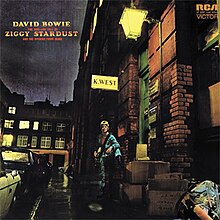
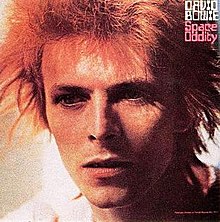
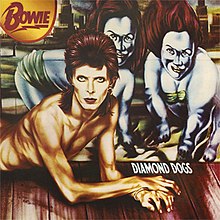



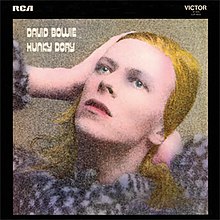
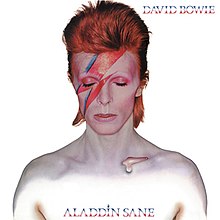

.jpg/220px-Tonight_(album).jpg)



.jpg/220px-Low_(album).jpg)
